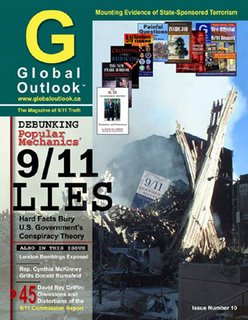The Plan
 Leo Strauss’ Philosophy of Deception
Leo Strauss’ Philosophy of DeceptionJim Lobe
Many neoconservatives like Paul Wolfowitz are disciples of a philosopher who believed that the elite should use deception, religious fervor and perpetual war to control the ignorant masses...
Strauss is a popular figure among the neoconservatives. Adherents of his ideas include prominent figures both within and outside the administration. They include ’Weekly Standard’ editor William Kristol ; his father and indeed the godfather of the neoconservative movement, Irving Kristol ; the new Undersecretary of Defense for Intelligence, Stephen Cambone, a number of senior fellows at the American Enterprise Institute (AEI) (home to former Defense Policy Board chairman Richard Perle and Lynne Cheney), and Gary Schmitt, the director of the influential Project for the New American Century (PNAC), which is chaired by Kristol the Younger

As Hersh notes in his article, Shulsky and his co-author Schmitt "criticize America’s intelligence community for its failure to appreciate the duplicitous nature of the regimes it deals with, its susceptibility to social-science notions of proof, and its inability to cope with deliberate concealment." They argued that Strauss’s idea of hidden meaning, "alerts one to the possibility that political life may be closely linked to deception. Indeed, it suggests that deception is the norm in political life, and the hope, to say nothing of the expectation, of establishing a politics that can dispense with it is the exception.
...
 Rule One : Deception
Rule One : Deception It’s hardly surprising then why Strauss is so popular in an administration obsessed with secrecy, especially when it comes to matters of foreign policy. Not only did Strauss have few qualms about using deception in politics, he saw it as a necessity. While professing deep respect for American democracy, Strauss believed that societies should be hierarchical - divided between an elite who should lead, and the masses who should follow. But unlike fellow elitists like Plato, he was less concerned with the moral character of these leaders. According to Shadia Drury, who teaches politics at the University of Calgary, Strauss believed that "those who are fit to rule are those who realize there is no morality and that there is only one natural right - the right of the superior to rule over the inferior."
This dichotomy requires "perpetual deception" between the rulers and the ruled, according to Drury. Robert Locke, another Strauss analyst says,"The people are told what they need to know and no more." While the elite few are capable of absorbing the absence of any moral truth, Strauss thought, the masses could not cope. If exposed to the absence of absolute truth, they would quickly fall into nihilism or anarchy, according to Drury, author of ’Leo Strauss and the American Right’ (St. Martin’s 1999).

Second Principle : Power of Religion
According to Drury, Strauss had a "huge contempt" for secular democracy. Nazism, he believed, was a nihilistic reaction to the irreligious and liberal nature of the Weimar Republic. Among other neoconservatives, Irving Kristol has long argued for a much greater role for religion in the public sphere, even suggesting that the Founding Fathers of the American Republic made a major mistake by insisting on the separation of church and state. And why ? Because Strauss viewed religion as absolutely essential in order to impose moral law on the masses who otherwise would be out of control.
At the same time, he stressed that religion was for the masses alone ; the rulers need not be bound by it. Indeed, it would be absurd if they were, since the truths proclaimed by religion were "a pious fraud."
As Ronald Bailey, science correspondent for Reason magazine points out, "Neoconservatives are pro-religion even though they themselves may not be believers."
"Secular society in their view is the worst possible thing,’’ Drury says, because it leads to individualism, liberalism, and relativism, precisely those traits that may promote dissent that in turn could dangerously weaken society’s ability to cope with external threats. Bailey argues that it is this firm belief in the political utility of religion as an "opiate of the masses" that helps explain why secular Jews like Kristol in Commentary magazine and other neoconservative journals have allied themselves with the Christian Right and even taken on Darwin’s theory of evolution.
 Third Principle : Aggressive Nationalism
Third Principle : Aggressive NationalismLike Thomas Hobbes, Strauss believed that the inherently aggressive nature of human beings could only be restrained by a powerful nationalistic state. "Because mankind is intrinsically wicked, he has to be governed," he once wrote. "Such governance can only be established, however, when men are united - and they can only be united against other people" (gays against straights, women against men, integrity verses this evil).
Not surprisingly, Strauss’ attitude toward foreign policy was distinctly Machiavellian. "Strauss thinks that a political order can be stable only if it is united by an external threat," (so did Hitler), Drury wrote in her book. "Following Machiavelli, he maintained that if no external threat exists then one has to be manufactured (emphases added)."
"Perpetual war, not perpetual peace, is what Straussians believe in," says Drury. The idea easily translates into, in her words, an "aggressive, belligerent foreign policy," of the kind that has been advocated by neocon groups like PNAC and AEI scholars - not to mention Wolfowitz and other administration hawks who have called for a world order dominated by U.S. military power. Strauss’ neoconservative students see foreign policy as a means to fulfill a "national destiny" - as Irving Kristol defined it already in 1983 - that goes far beyond the narrow confines of a " myopic national security."
...
Hardly original thinkers, the Bush cabal is carrying out the Strauss philosophy verbatim.
An entire cabal of beings with no morality, no respect for the law, and no conscience - who fund both sides of every war and use the poor as cannon fodder for their greed. They control people through religion, while behaving in ways that could at best be called barbaric.
The USA is under an occupation of its own, that is unchecked, unbalanced and criminal, I think we can safely add psychopathic.


0 Comments:
Post a Comment
<< Home